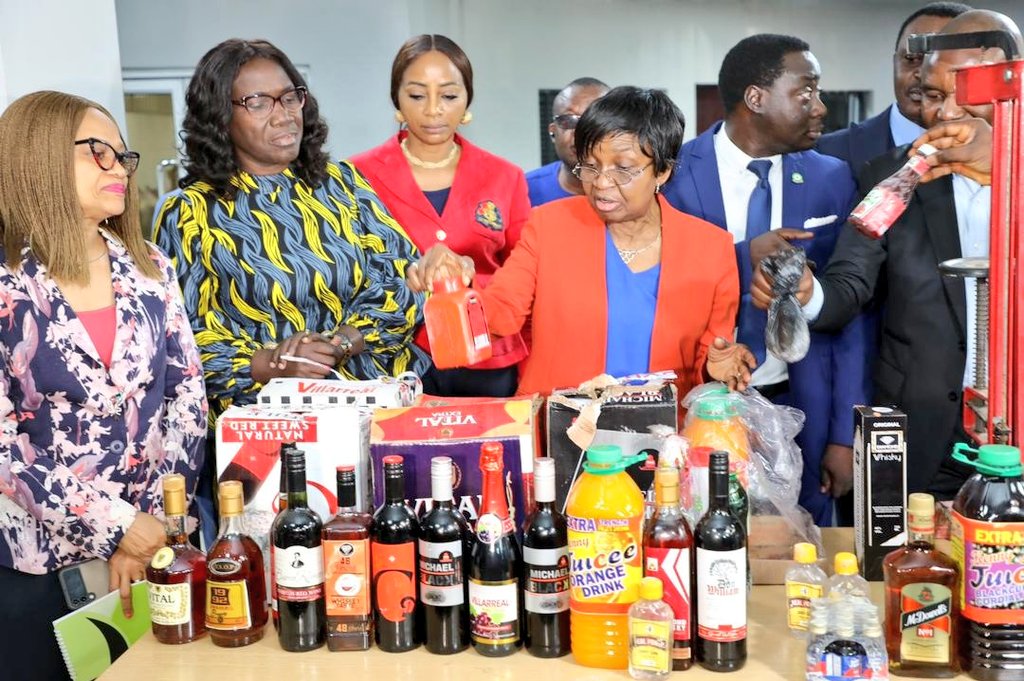On Monday, December 18, news broke of the bust of a fake winery in the industrial city of Aba by the National Agency for Food and Drug Administration Control (NAFDAC). At least 240 shops involved in producing popular beverages and liquors—including Coca-Cola, Eva and Hennessy—were busted during the raid. During a media parley, the director-general estimated that the confiscated drinks were worth N750 million.
In the wake of the bust, Nigerians have since taken to social media to share their experiences with adulterated drinks, posting pictures of some of the fake drinks. A telling sign of these counterfeit drinks is the distorted—and often humorous—spelling of the original brand name.
Wetin be this? ???????????? pic.twitter.com/0CNjMlQwiJ
— Damilola Coker #Bags/Fabrics plug. (@dami_unleashed) December 18, 2023
Prior to the recent furore, a little over a week ago, Daniel Benson, a Nigerian artiste popularly known as BNXN, lamented the prevalence of fake alcoholic drinks in many nightclubs.
“Respect my health, respect my money. Give me what I pay for. If you don’t have it, don’t bring a fake one,” the artiste wrote on his official page on X.
But the problem of counterfeiting in Nigeria is not new. Dr. Dora Akunyili is largely remembered in Nigeria’s history for her dogged battle against counterfeit drugs. Having lost a sister to fake insulin treatment in 1998, Akunyili waged war against illicit medicines on open-air markets in Lagos and Onitsha, confiscated fake drugs that were worth billions of Naira, and convicted at least 45 counterfeiters.
Successive administrations since 2010 have hardly matched up to Akunyili’s reputation. Hence, counterfeiting has begun to rear its ugly head again in the markets.
One possible reason for the surge in fakery on the local market is the country’s lax legislation and the absence of draconian punishment for counterfeiters. For instance, a federal high court granted a drug baron accused of managing a methaphetamine laboratory a fine of 4 million naira along with community service. The abundance of counterfeit products is a testament to the laxity of Nigerian law around counterfeiting and related offences, notwithstanding the many different regulatory agencies that abound.
In Nigeria, NAFDAC is responsible for regulating and controlling the manufacture, importation, exportation, advertisement, distribution, sale and use of food, drugs, cosmetics, medical devices, chemicals and packaged water. As seen in the countless images that have spread across X, many of these substandard products brazenly bear NAFDAC numbers, even though the agency states in its Act that “no herbal medicinal product should be manufactured, exported, advertised, sold or distributed in Nigeria unless it has been registered.”
However, the agency’s dereliction of duty through the years has given rein to these counterfeit products to flourish in the Nigerian market.
In June, Premium Times launched an investigation into a low-end herbal tonic (Baba Aisha) touted to heal common diseases. Rounds of laboratory tests conducted during the investigation confirmed that Baba Aisha was potentially harmful to the kidney and liver, despite enjoying patronage from many residents within the capital city of Abuja.
In addition, producers of fake beverages have cashed in on the country’s rampant inflation to adulterate original drinks and drugs, which they sell at a cost less than the standard price to unwitting consumers. Of course, with dwindling purchasing power, many Nigerians settle for the cheap, adulterated version over the more expensive original brand
The unregulated supply of fake drinks and foods on the market means that more Nigerians are likely to bear the consequences of food poisoning and damaged body organs. Today, according to WHO, liver and kidney diseases rank among the most deadly ailments. To put this into context, about 20 million of the population live with kidney diseases, says the Nigerian Association of Nephrology.
How many more Nigerians will be opted into the statistics in the months to come? As history has shown, this is likely the end of the battle against counterfeiting. More than a moment of celebration, the recent NAFDAC bust is a dire reminder of the inefficiency of the country’s regulatory framework.
On December 18, the National Agency for Food and Drug Administration Control (NAFDAC) busted a fake winery in Aba, seizing counterfeit beverages worth N750 million, including popular brands like Coca-Cola and Hennessy. This prompted Nigerians to share their experiences with such products on social media. Nigerian artiste BNXN had recently criticized the prevalence of fake alcoholic drinks in clubs.
Counterfeiting in Nigeria is a persistent issue, exacerbated by lax legislation and inadequate penalties for offenders. Despite NAFDAC's regulatory responsibilities, the agency's inefficiency has allowed counterfeit products to thrive. An investigation by Premium Times revealed the harmful effects of a widely consumed herbal tonic, Baba Aisha. Producers exploit Nigeria’s inflation to sell adulterated drinks and drugs at lower prices, leading to health risks like kidney and liver diseases.
The surge in counterfeit goods, despite the recent bust, highlights the inefficiency of Nigeria’s regulatory framework and raises concerns about the ongoing battle against counterfeiting.






